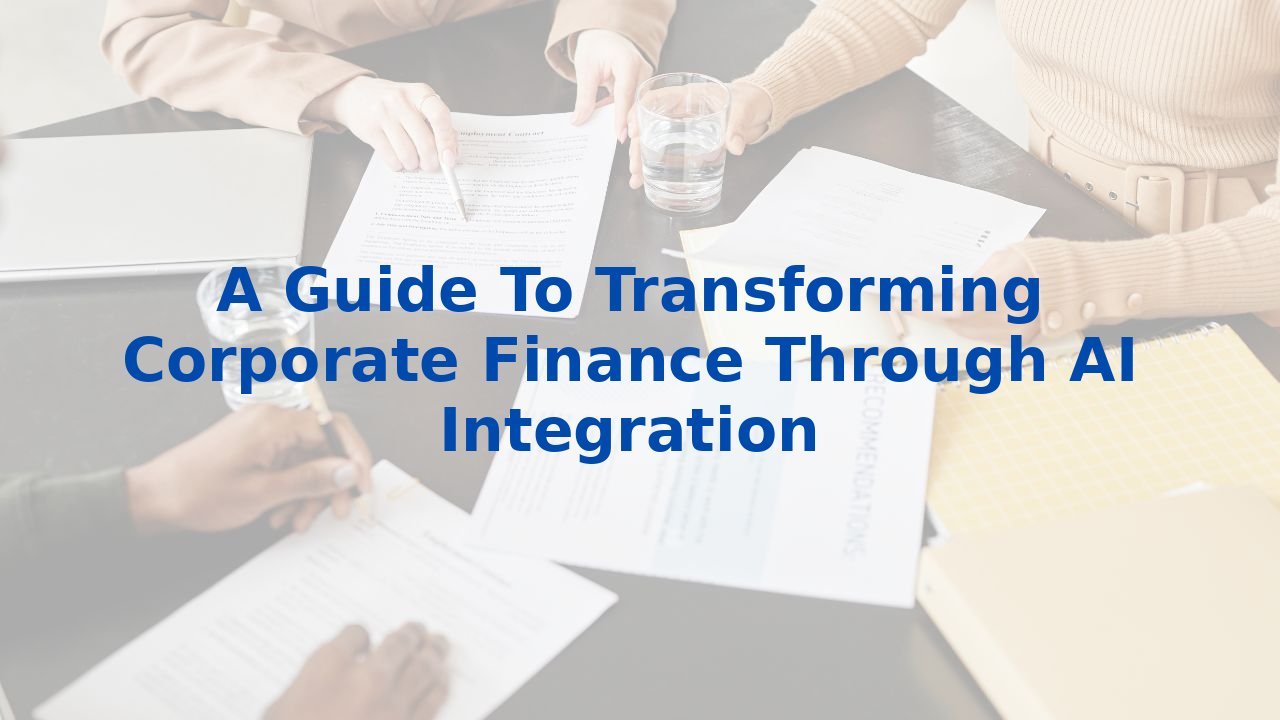A Guide To Transforming Corporate Finance Through AI Integration
A Guide To Transforming Corporate Finance Through AI Integration
Introduction
The financial world is on the verge of a monumental shift, fueled by the integration of Artificial Intelligence (AI). Traditional financial processes are being reshaped, laying the foundation for innovative practices that enhance operational efficiency. This guide explores core business processes within corporate finance and highlights how AI can revolutionize these functions, driving efficiency and productivity across the organization.
Enhancing Financial Processes with AI
1. Risk Management
Traditional risk management has long been a labor-intensive endeavor, often requiring extensive manual data scrutiny to spot potential threats. This tedious process is not only time-consuming but also susceptible to human errors, ultimately hindering decision-making.
With AI, organizations can breathe easier. AI algorithms have the capability to analyze vast amounts of data in real-time, swiftly identifying patterns and anomalies that signify potential risks. This proactive approach enables financial institutions to act decisively and mitigate risks effectively, achieving a level of foresight previously unattainable.
2. Financial Analytics
Conventional financial analytics relies heavily on manual intervention, often leading to inaccuracies and slow insights. The challenge lies in efficiently sifting through enormous datasets.
AI transforms this process by quickly crunching vast amounts of financial data, bringing forth valuable insights that enhance accuracy and speed in decision-making. Organizations equipped with AI-driven analytics tools possess a distinct advantage—providing fast, reliable analyses that empower strategic initiatives.
3. Fraud Detection
Fraud detection has historically depended on manual transaction reviews, an approach fraught with resource strain and the risk of overlooking anomalies.
AI revolutionizes this by employing sophisticated algorithms to spot unusual transaction patterns. Non-stop monitoring elevates the capability to detect fraudulent activities effectively, drastically reducing the risk of financial loss and enhancing overall security for both institutions and customers alike.
4. Predictive Analytics
Traditional predictive analytics often leans heavily on historical data and simplistic forecasting techniques, which may not capture the full scope of market behavior.
AI excels in this arena by drawing on complex datasets to deliver predictions about future market trends, customer behavior, and prospective risks. This capabilities grant financial institutions the foresight needed to navigate fluctuations in the market confidently.
5. Compliance and Regulatory Requirements
Compliance can be cumbersome, plagued by manual monitoring and reporting requirements that lead to inefficiencies and a heightened risk of oversight.
Embracing AI allows organizations to automate compliance processes, guaranteeing adherence to relevant regulations without extensive human intervention. By using AI, firms simplify monitoring and resource allocation, significantly cutting down on the risks associated with non-compliance and potential penalties.
Benefits of AI for Improving Efficiency
1. Automation of Routine Tasks
AI's aptitude for automating repetitive and mundane tasks allows finance professionals to redirect their focus toward high-value activities, such as strategic planning and complex decision-making.
2. Enhanced Customer Experience
Imagine a world where AI-powered chatbots offer around-the-clock customer service. Utilizing AI in this capacity not only reduces the burden on human agents but also enriches customer experience through immediate responses and real-time assistance—including credit approvals and fraud detection.
3. Cost Reduction
The cost implications of AI integration are significant. By streamlining workflows and conducting tasks with unprecedented speed, financial organizations can enjoy substantial savings on manual labor costs while enhancing overall operational efficiency.
The Importance of Training Employees for AI
While the benefits of AI are undeniable, the successful integration of these technologies is contingent upon a well-prepared workforce. Training employees to work effectively alongside AI systems is paramount. Here’s why:
1. Understanding AI Applications
Employees must grasp how AI can elevate their roles and organization efficiency. Tailored training extends beyond rudimentary concepts, focusing on practical applications in finance such as risk management and predictive analytics.
2. Developing New Skills
As AI assumes more routine tasks, employees must cultivate complementary skills like data analysis, machine learning, and programming. These new competencies will position them to harness AI's full potential.
3. Adopting Ethical Considerations
With great power comes great responsibility. Understanding ethical considerations surrounding AI is crucial. Training programs should emphasize ethical implications, ensuring employees navigate issues like data privacy and algorithmic bias with care.
4. Enhancing Decision-Making
A workforce versed in AI can more effectively interpret AI-generated insights, leading to more nuanced decision-making that aligns with organizational strategy.
Conclusion
The future of corporate finance resides in the seamless integration of AI, transforming traditional processes into landscapes of opportunity and efficiency. By adapting to innovations in risk management, financial analytics, fraud detection, and predictive analytics, organizations can realize the full benefits of AI. Yet, equipping employees through targeted training is critical to maximizing these advantages. As the financial sector continues to adapt, prioritizing AI integration and employee education will be essential for sustained competitive success.



